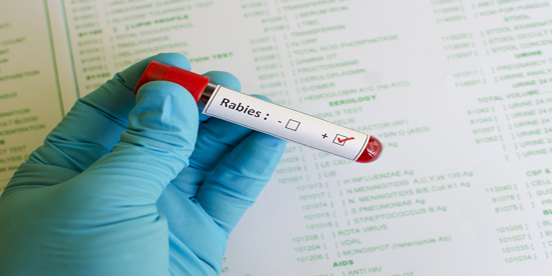Current Suspected Overdose Deaths in Delaware for 2025: Get Help Now!
Find school water testing results and additional resources
Attention Medicaid Participants: Eligibility Renewals Restarted April 1, 2023
Josette Manning, Secretary
DPH Media Contact:
Laura Matusheski
Media Relations Coordinator
Email: DPHMedia@Delaware.gov
Date: June 26, 2024
DHSS-6-2024
DOVER, DEL. (June 26, 2024) - With the weather warming up, the Delaware Division of Public Health (DPH) urges the public to take precautions to avoid exposure to rabies and to be on the lookout for rabid animals during this active season.
Rabies is endemic in Delaware, meaning it occurs regularly within the state's wildlife populations. Since 2019, 54 animals have tested positive for rabies in Delaware. That number represents only a fraction of rabies in Delaware since, in most cases, DPH only tests animals that have potentially exposed humans to rabies.
According to the U.S. Department of Agriculture (USDA), some of the visible signs of a rabid animal could include the animal being aggressive (e.g., attacking for no reason) or confused and/or drunk-like (e.g., walking in a circle).
While any warm-blooded mammal is susceptible to rabies, the most common hosts of rabies in Delaware are community (stray or feral) cats, bats, raccoons, skunks, and foxes. Other local cases have also been seen in smaller numbers in cattle, equine, deer, groundhogs, and coyotes.
Rabies is a fatal, yet preventable viral disease, and severe outcomes in humans can be avoided when treatment is administered soon after exposure before the disease develops. People usually get rabies from the bite of a rabid animal. It is also possible, but rare, for people to get rabies from non-bite exposures, including scratches, abrasions, or open wounds that are exposed to saliva or other potentially infectious material from a rabid animal.
It is important to seek immediate medical attention and early treatment to prevent severe health outcomes. If you have been potentially exposed to an animal that seems likely to be infected with rabies, wash all wounds thoroughly with soap and water and seek medical attention immediately, even if the wound seems minor. All medical providers are required to report potential human exposure to the DPH Rabies Hotline by calling 302-744-4990 or by completing the human exposure report found at https://www.dhss.delaware.gov/dhss/dph/dpc/rabies.html
If You Encounter a Wild Animal Behaving Aggressively:
If You Encounter a Sick or Injured Wild Animal:
How to Protect Yourself and Your Family from Rabies:
How to Protect Your Pets from Rabies:
For more information on the DPH Rabies Program, visit www.dhss.delaware.gov/dhss/dph/dpc/rabies.html or call 1-888-285-5156 (24/7) or 302-744-4995 (business hours).
For more information on rabies, visit the Centers for Disease Control and Prevention (CDC) at www.cdc.gov/rabies/,

The Delaware Division of Public Health (DPH), a division of the Delaware Department of Health and Social Services, is a nationally accredited public health agency recognized by the Public Health Accreditation Board for its outstanding dedication to driving change through innovation.
Anyone who is deaf, hard of hearing, Deaf-Blind or speech disabled can contact DPH by dialing 711 first using specialized devices (i.e. TTY, TeleBraille, voice devices). The 711 service is free and to learn more about how it works, please visit delawarerelay.com.
Delaware Health and Social Services is committed to improving the quality of the lives of Delaware's citizens by promoting health and well-being, fostering self-sufficiency, and protecting vulnerable populations.